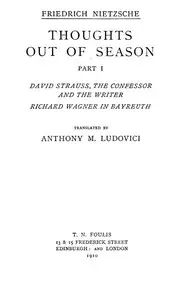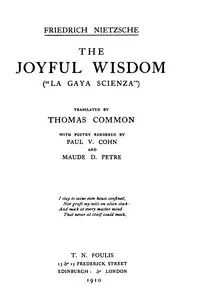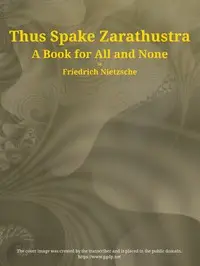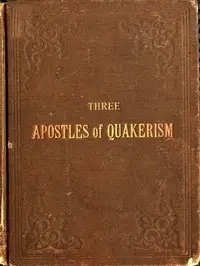"Thoughts out of Season, Part I" by Friedrich Wilhelm Nietzsche is a philosophical text written in the late 19th century. This work presents Nietzsche's critiques of contemporary culture and morality, exploring themes such as the consequences of national pride following Germany's victory in the Franco-Prussian War and the nature of genuine culture versus mere cultivation. Central figures in this examination include David Strauss and Richard Wagner, whose works and legacies prompt Nietzsche's reflections on art, culture, and the future of humanity. At the start of the text, Nietzsche discusses the aftermath of the war, emphasizing the danger of complacency that often follows victory. He warns against the prevailing belief that German culture itself has triumphed, suggesting instead that the military success was due to factors unrelated to genuine cultural achievement. He critiques "culture-Philistinism," the shallow cultural attitudes that he believes threaten to overshadow true artistic and intellectual growth. Nietzsche sets the tone for his polemics against complacency in the face of a flourishing yet insipid culture, using the ideas of Strauss and Wagner as focal points for his arguments. (This is an automatically generated summary.)

Thoughts out of Season, Part I David Strauss, the Confessor and the Writer - Richard Wagner in Bayreuth.
By Friedrich Wilhelm Nietzsche
"Thoughts out of Season, Part I" by Friedrich Wilhelm Nietzsche is a philosophical text written in the late 19th century. This work presents Nietzsche...
Friedrich Wilhelm Nietzsche was a German classical scholar, philosopher, and critic of culture, who became one of the most influential of all modern thinkers. He began his career as a classical philologist before turning to philosophy. He became the youngest person to hold the Chair of Classical Philology at the University of Basel in Switzerland in 1869, at the age of 24, but resigned in 1879 due to health problems that plagued him most of his life; he completed much of his core writing in the following decade. In 1889, at age 44, he suffered a collapse and afterward a complete loss of his mental faculties, with paralysis and probably vascular dementia. He lived his remaining years in the care of his mother until her death in 1897, and then with his sister Elisabeth Förster-Nietzsche. Nietzsche died in 1900, after experiencing pneumonia and multiple strokes.


















